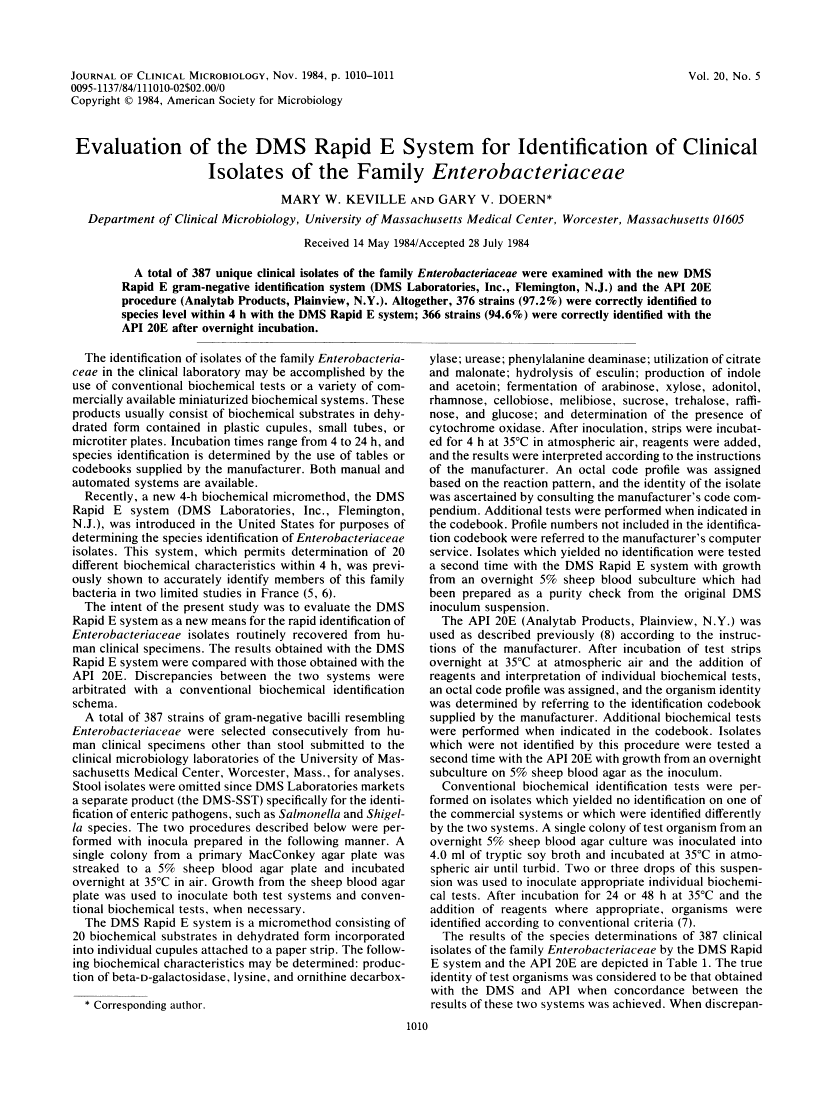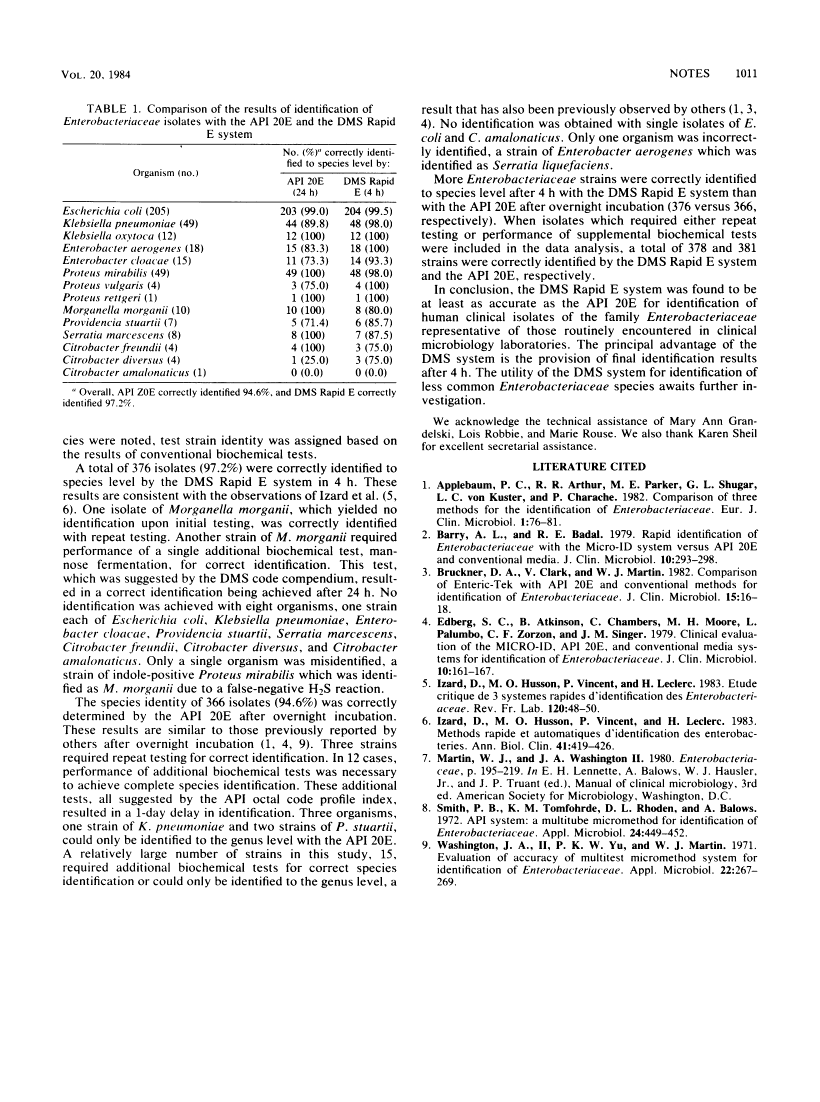Abstract
Free full text

Evaluation of the DMS Rapid E system for identification of clinical isolates of the family Enterobacteriaceae.
Abstract
A total of 387 unique clinical isolates of the family Enterobacteriaceae were examined with the new DMS Rapid E gram-negative identification system (DMS Laboratories, Inc., Flemington, N.J.) and the API 20E procedure (Analytab Products, Plainview, N.Y.). Altogether, 376 strains (97.2%) were correctly identified to species level within 4 h with the DMS Rapid E system; 366 strains (94.6%) were correctly identified with the API 20E after overnight incubation.
Full text
Full text is available as a scanned copy of the original print version. Get a printable copy (PDF file) of the complete article (412K), or click on a page image below to browse page by page. Links to PubMed are also available for Selected References.
Selected References
These references are in PubMed. This may not be the complete list of references from this article.
- Appelbaum PC, Arthur RR, Parker ME, Shugar GL, von Kuster LC, Charache P. Comparison of three methods for identification of Enterobacteriaceae. Eur J Clin Microbiol. 1982 Apr;1(2):76–81. [Abstract] [Google Scholar]
- Barry AL, Badal RE. Rapid identification of Enterobacteriaceae with the micro-ID system versus API 20E and conventional media. J Clin Microbiol. 1979 Sep;10(3):293–298. [Europe PMC free article] [Abstract] [Google Scholar]
- Bruckner DA, Clark V, Martin WJ. Comparison of Enteric-Tek with API 20E and conventional methods for identification of Enterobacteriaceae. J Clin Microbiol. 1982 Jan;15(1):16–18. [Europe PMC free article] [Abstract] [Google Scholar]
- Edberg SC, Atkinson B, Chambers C, Moore MH, Palumbo L, Zorzon CF, Singer JM. Clinical evaluation of the MICRO-ID, API 20E, and conventional media systems for identification of Enterobacteriacea. J Clin Microbiol. 1979 Aug;10(2):161–167. [Europe PMC free article] [Abstract] [Google Scholar]
- Izard D, Husson MO, Vincent P, Leclerc H. Méthodes rapides et automatiques d'identification des entérobactéries. Ann Biol Clin (Paris) 1983;41(6):419–426. [Abstract] [Google Scholar]
- Smith PB, Tomfohrde KM, Rhoden DL, Balows A. API system: a multitube micromethod for identification of Enterobacteriaceae. Appl Microbiol. 1972 Sep;24(3):449–452. [Europe PMC free article] [Abstract] [Google Scholar]
- Washington JA, 2nd, Yu PK, Martin WJ. Evaluation of accuracy of multitest micromethod system for identification of Enterobacteriaceae. Appl Microbiol. 1971 Sep;22(3):267–269. [Europe PMC free article] [Abstract] [Google Scholar]
Associated Data
Articles from Journal of Clinical Microbiology are provided here courtesy of American Society for Microbiology (ASM)
Full text links
Read article at publisher's site: https://doi.org/10.1128/jcm.20.5.1010-1011.1984
Read article for free, from open access legal sources, via Unpaywall:
https://jcm.asm.org/content/jcm/20/5/1010.full.pdf
Free to read at intl-jcm.asm.org
http://intl-jcm.asm.org/cgi/content/abstract/20/5/1010
Free after 4 months at intl-jcm.asm.org
http://intl-jcm.asm.org/cgi/reprint/20/5/1010.pdf
Citations & impact
Impact metrics
Citations of article over time
Article citations
Reevaluation of the API 20E identification system versus conventional biochemicals for identification of members of the family Enterobacteriaceae: a new look at an old product.
J Clin Microbiol, 30(1):123-125, 01 Jan 1992
Cited by: 25 articles | PMID: 1734043 | PMCID: PMC265006
Evaluation of the Micro-ID, the API 20E and the Rapid 20E for same-day identification of Enterobacteriaceae.
Eur J Clin Microbiol, 4(5):498-501, 01 Oct 1985
Cited by: 1 article | PMID: 3905400
Four hour identification of Enterobacteriaceae with the API Rapid 20E and Micro-ID systems.
J Clin Pathol, 38(10):1132-1138, 01 Oct 1985
Cited by: 1 article | PMID: 3902898 | PMCID: PMC499454
Feasibility of same-day identification of members of the family Vibrionaceae by the API 20E system.
J Clin Microbiol, 23(4):715-717, 01 Apr 1986
Cited by: 6 articles | PMID: 3517061 | PMCID: PMC362823
Comparison of API 20E, API rapid E, and API rapid NFT for identification of members of the family Vibrionaceae.
J Clin Microbiol, 22(5):778-781, 01 Nov 1985
Cited by: 27 articles | PMID: 4056003 | PMCID: PMC268525
Go to all (6) article citations
Similar Articles
To arrive at the top five similar articles we use a word-weighted algorithm to compare words from the Title and Abstract of each citation.
Evaluation of the four-hour rapid 20E system for identification of members of the family Enterobacteriaceae.
J Clin Microbiol, 20(1):51-54, 01 Jul 1984
Cited by: 14 articles | PMID: 6378967 | PMCID: PMC271244
Comparison of the API rapid E four-hour system with the API 20E overnight system for the identification of routine clinical isolates of the family Enterobacteriaceae.
J Clin Microbiol, 21(4):542-545, 01 Apr 1985
Cited by: 12 articles | PMID: 3886691 | PMCID: PMC271715
Laboratory evaluation of the AutoMicrobic system for identification of Enterobacteriaceae.
J Clin Microbiol, 13(5):895-898, 01 May 1981
Cited by: 6 articles | PMID: 7016913 | PMCID: PMC273913
Evaluation of API 20E System and Encise Enterotube for the identification of Enterobacteriaceae of animal origin.
Can J Comp Med, 44(3):315-319, 01 Jul 1980
Cited by: 4 articles | PMID: 7000321 | PMCID: PMC1320080





